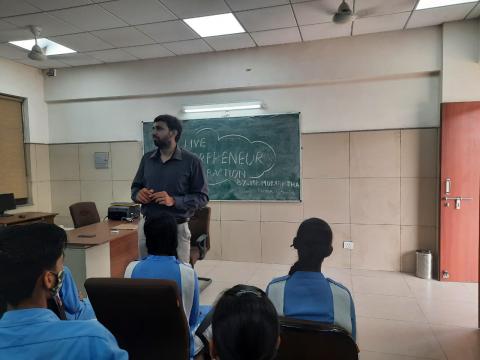
Whose knowledge is this?
The fundamental shift in knowledge formation requires us to ask...Whose knowledge is this?
Western white males continue to create and validate knowledge that forms the megastructure in which all other knowledge exists. From this knowledge megastructure we derive most of our ideas about nations, democracy, economies, international relations, etc.
It doesn't mean that the scholars have not challenged this hegemonic structure. This megalomaniac structure of knowledge was challenged by the Frankfurt School. In India, the Brahmanic tradition of knowledge still dominates the discourse in most parts of our life. However, it was sharply challenged by Ambedkar and Periyar and a parallel discourse was shaped. Women's issues received Global attention from several eminent writers; Simone de Beauvoir, Bell hooks and many other scholars significantly challenged the men's view of the world. In India too in the very beginning, Pandita Ramabai, Rokeya Hossain, and Savitribai Phule led the movement of an alternative knowledge structure. Millions of people gained a new sense of identity and perception through both the Ambedkarite school of thought and feminism.
The worldview for teachers remains unchallenged even today when we explore the questions; who the teacher is? In the public domain, all the knowledge about teachers comes from people who are not teachers. Most of the seminars and conferences discussing the issues related to teachers have a negligible presence of teachers. If they are included, it serves no purpose other than to add and stir.
University's preparing teachers ban the access of teachers in its teacher training programs. A teacher's experience as a school teacher is not considered if they wish to teach in one of these teacher training institutes. The knowledge they have gained as a school teacher is not valued or considered important by universities.
Why is this a situation?
Is the teacher responsible for the historical marginalization from the space of knowledge formation? I think Simone answers accurately. She has written it in the context of women but it is relevant for teachers as well. Simone, in her book, The Second Sex, writes " Only since women have begun to feel at home on this earth has a Rosa Luxemburg or a Mme Curie emerged. They brilliantly demonstrate that it is not women’s inferiority that has determined their historical insignificance: it is their historical insignificance that has doomed them to inferiority" (Beauvoir 1949:288)
This is the historical insignificance which has doomed teachers to interiority. By inferiority, I mean the absence of teachers from the domain of knowledge creation. As prof. Padma Sarangapani mentioned in her remark yesterday at Delhi Education Conference—"It's the research that leads to the formation of new knowledge". Professor Krishna Kumar has identified the process that led to this historical insignificance of teachers in his paper, "Meek dictator: The paradox of teacher’s personality. Politics of Education in Colonial India".
When attempts have been made to change this process, the results have been phenomenal. The Mentor Teacher program of the Delhi Government is one such example. Many university teachers have confided to me that they wish to imitate Mentor Teachers. Their engagement with the issues of education has been exemplary.
Delhi Teacher University offers both teachers and the university a unique opportunity. It's an opportunity to reverse the historical process and engage teachers with the process of knowledge creation, i.e the research. Unfortunately, NEP doesn't see research as a desirable skill for teachers. NCTE in its recent document on teacher professional development does mention the need for research skills for teachers. However, it was unable to break free of the stereotype that limits teachers to Action Research. We won't be able to answer questions of education authentically until we involve teachers in conventional research.
Simone gave women's concerns a voice, Marx gave farmers and laborers a voice, and Dalits in India found B.R Ambedkar. I wonder who will write the Magnum Opus for teachers. I wonder who will find a voice for them. In proper nouns, I can't answer, but in common nouns, definitely teachers.
- Log in to post comments
